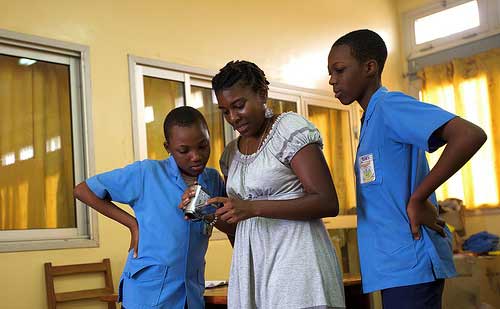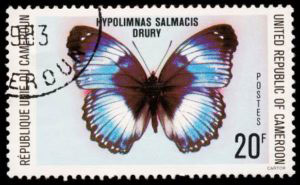“Everybody has a story – everybody. And there is something to be learned from every experience, no matter what it is.” Oprah Winfrey. This quote struck me and has remained in my mind since I first read it. I’ve come to the realization that women all over the world have so much to offer. Unfortunately, most of the time, we do not realize just how much treasure we have inside of us.
In this issue of DUNIA Magazine, we will look at Heather’s journey, as she takes us from the city of Raleigh, North Carolina, U.S.A. where she was born and raised, to Buea, in the southwest province of Cameroon, West Africa where she has been residing for the past four months.

Heather Faison is a multimedia journalist with a degree in Graphic Design and Journalism from Howard University in Washington, D.C. She was also a Kiplinger Digital Media Fellow at Ohio State University. Although she enjoys what she does, Heather wanted to be involved in something different. So, last summer she applied for the Youth Advocacy Network (YAN) fellowship to teach a News Media Advocacy class at the Bilingual Grammar School Molyko in Buea, Cameroon. She also agreed to teach a Video Production course at the Buea Deaf School in Cameroon.
When Heather set out to Buea last October, she didn’t realize exactly what a ride this would be. The only thing she was sure of was that she strongly believed in the vision of YAN and she deeply wanted to be instrumental in making a difference in the lives of young people who had not had the privilege of learning computer skills; skills that are critical in today’s world where technology is a key instrument of success.
 “I had the typical stereotype, expecting to be in a village. Instead, I saw a city with a university that is amongst one of the best in the country.” She continues, “I was shocked to see that Cameroon is much more developed than what I see on TV.”
“I had the typical stereotype, expecting to be in a village. Instead, I saw a city with a university that is amongst one of the best in the country.” She continues, “I was shocked to see that Cameroon is much more developed than what I see on TV.”
Having lived in Washington, D.C. for several years, Heather had had the chance to interact with people from different parts of the world and had thus been exposed to a certain amount of cultural diversity. She states that she had high expectations as far as how she would be welcomed, expecting more warmth. Instead, she has been surprised at how differently she is treated from other Americans — especially whites. Heather attributes this to bias and skewed information they have been exposed to; which brings about the importance of being culturally educated and seeking awareness beyond the things that are immediately available to us. It took her some time to understand this and realize that the people didn’t mean to be disrespectful towards her.
The Fabric of Society
Another culture shock for Heather Faison was the overwhelming sense of family and social support. “People are there for one another,” she notes.
The family structure is not always the same as that which our young journalist is used to in her home country. In the United States, women tend to be more independent, and more self sufficient. She herself comes from one of those families with particularly strong independent women. Moreover, in Africa, polygamy is not illegal, so it is not uncommon to see a family unit with several wives. This greatly influences the dynamics of the relationship between the men and women. She observed that African men tend to be more domineering. But that seemed to change with the level of education achieved. She noticed that women who have a higher level of education are less likely to be involved in polygamous relationships, less likely to have too many children, and do not marry as young as those without higher degrees.
Something else that Heather noticed is how marriage and the nuclear family are valued. She observes that in Cameroon, divorce exists but rarely happens; for one, the law makes it difficult to obtain a divorce. But more importantly, people are culturally conditioned to want to make marriages work at all costs.
Standards of Beauty
When Heather decided to spend time in Cameroon, the last thing she expected was to have difficulties dealing with her hair. She wears her hair “natural”, meaning not chemically treated or relaxed. To her, going to a country in Africa, the motherland, she would not have dreamed of having a hard time getting her hair done. Much to her surprise, the majority of women do not have their hair in a natural state and finding a way to maintain hers has been somewhat of a challenge – people are oblivious as to how to take care of ethnic hair in a natural state, with the exception of braids which she doesn’t want to wear. She says many are trying to convince her either to have her hair “relaxed” or braided. It has been funny at times but also frustrating. More importantly, Heather sees it is yet another sign that women have embraced the European ideals and standards of beauty.
Another sign of the European influence is how widespread skin “bleaching” (also known as shadeism) is. “The first time I saw a skin lightening product I almost fell over.” Ms. Faison recalls with passion in her voice. “It is not only an ‘Africa’ thing, it is also part of the American culture – these images of light skinned people plastered all over magazines, in videos … but seeing it here, in the cradle of civilization was heartbreaking. Men and women practice it. It is a form of self-hatred. You cannot go in a store without seeing those lightening products. It is an issue that is hard to sugarcoat. It has horrific effects on one’s self esteem and is severely dangerous for the skin.”
In an effort to make a difference, Heather has decided to maintain an ongoing discussion about this with her students. “If I get my kids to talk about themselves positively, to have a different self image, maybe it can make a difference and they would see that there is no need for that practice”.
Ups and Downs
I cannot recall the number of times I heard Heather use the expression “my kids” in reference to her students. There is no doubt that she is passionate, not only about her work, but also cares for her students personally. As stated earlier, bringing computer literacy, social networking knowledge and other skills was what originally brought her on this adventure. Although she has greatly enjoyed her new line of work, it has not been a smooth ride for many reasons. The first challenge on her list: power outages. These are very frequent in that part of the country. Added to that, an extremely slow internet connection makes teaching a computer class very difficult. But she says it has also taught her to be resourceful, creative and plan ahead of time.
Cameroon, in her view, is developing, but very slowly as far as technology is concerned. “There is a lot of potential in those kids,” she observes. “They are very bright and intelligent for kids that haven’t had the same exposure to technology like kids in the United States. They catch on pretty fast and are eager to learn. It has been a great experience. I enjoy it because of the value I am adding to their lives. Textbooks and other school materials, things we take for granted, are lacking, but they work incredibly hard and do so much with so little.”
Still on the subject of education, Heather also observed that the good number of well educated youngsters in the university town where she resides, which is home to the University of Buea, are however are most likely to search for work outside their country, because of the lack of opportunities. Even with the same level of education as those in the United States, people in Cameroon are less likely to succeed, not because they are not intelligent, but because there aren’t many avenues to use that education.
“It is amazing to see how everything is tied together. The culture is a culture of survival and you can see it everywhere, even in the choice of food”.
To Heather, probably the biggest cultural shock thus far is the food. “Everything is starchy, and at the end of the day that is what fills you up,” she says. Fufu and Eru are staples in that region. “I come from the South, where cooking is of great importance. We take our time to cook and enjoy a great variety of food. Here, there is no presentation whatsoever.”
She said it has taken her some time to get used to the food, but she is starting to enjoy it a little bit more.
Lost for Words
Heather had a hard time expressing how much this experience has so far affected her life. For a journalist, it is unusual to be at a loss for words; the only explanation I could find during my talks with her, is that this has had a profound effect on her and she is still processing a lot of it. In her own words, she says, “It has greatly altered my perspective of life. My compassion for people has increased as well. You see people living in extreme poverty, but also some people very well off. Africa is not even close to the continent we perceive through the media. We are far more alike than we think we are. There are many more things that unite us than those that divide us. I have learned to be more appreciative, but more than that to just enjoy life.”
She says that if there is one thing she would like to leave us with, it is the importance of traveling, but not merely for recreational purposes. “So often we travel as tourists, staying in resorts, but I encourage anyone to get out there, get educated, go volunteer in orphanages, get involved with the people in those places, travel with a purpose and make a difference.”
You can learn more about Heather Faison and her work in Buea at https://www.youthadvocacynetwork.org/blog.php.
(First published in DUNIA print Magazine, issue 3 – column The Women’s Corner)
Disclaimer
Articles and comments on our website reflect the views and opinions of their individual authors, not the magazine as a whole.
